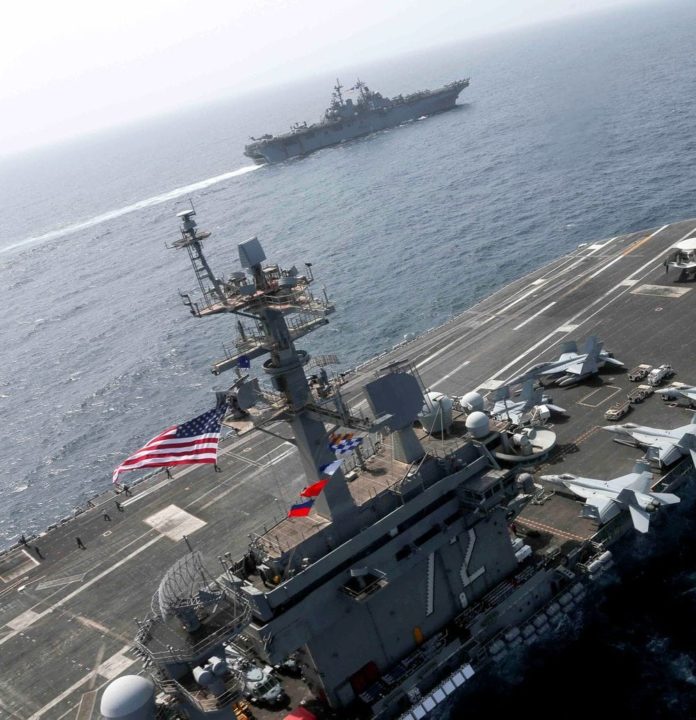Nader Entessar & Kaveh Afrasiabi
Middle East Eye / September 14, 2020
In light of the UAE-Israel deal, a major deterioration in bilateral relations between Tehran and Abu Dhabi could wipe out recent gains.
Amonth after US President Donald Trump’s surprise announcement of a peace agreement between the UAE and Israel – perceived as a timely boon for Trump’s re-election bid – the negative ramifications for Iran continue to mount.
Although UAE officials have insisted that the deal is “not directed at Iran”, there are plenty of reasons to think otherwise.
Brian Hook, the State Department’s special envoy for Iran, was among a handful US officials present at the White House ceremony where Trump boasted of a tripartite UAE-Israel-US “strategic agenda for the Middle East” to expand diplomatic, trade and security cooperation. Hook was also present during Trump’s announcement of the Bahrain-Israel peace deal.
Last month, Hook stepped down and was replaced by an ardent pro-Israel hawk, Elliott Abrams – reinforcing Tehran’s suspicion that the Trump administration is intent on escalating pressure on Iran and its allies.
Indeed, the timing of the UAE-Israel agreement – just days after the massive Beirut explosion, which some Iranian figures have suggested was a clandestine Israeli operation aimed at crippling Hezbollah – has fuelled growing concerns in Tehran that the Iran-led “Axis of Resistance” has been dealt a double blow.
News soon followed that Israel’s intelligence chief had travelled to the UAE just days after the historic deal, which is highly unpopular in the Arab street. It is widely believed that the UAE and Israel will increase their intelligence cooperation not only against Iran, but also against the Houthis in Yemen, who have threatened missile strikes on UAE targets.
Chief among Tehran’s concerns are the advanced F-35 fighter jets promised to the UAE as part of the agreement. If delivered, these will aggravate Iran’s security concerns and compel a greater reliance on Iran’s missile arsenal to counterbalance the air superiority of its Arab rivals in the Gulf.
While it remains to be seen whether the next US administration, Democrat or Republican, will proceed with the F-35 sale, a related issue is Israel’s potential assistance to the UAE’s missile defence system. This is not to overlook Israel’s ability to aid the UAE’s nuclear programme, notwithstanding Saudi and Emirati concerns about Iran’s “nuclear ambitions”.
‘Systemic shock’
According to a Tehran-based political science professor who spoke to MEE on condition of anonymity, the UAE’s agreement with Israel “is multidimensional and has a strong security component that shows the infusion of Israel in the security calculus of the region. This is tantamount to a systemic shock to the regional security structure.”
Little surprise, then, that Iran’s top officials have condemned the agreement as a “treasonous” deal that, in the words of the country’s supreme leader, has “allowed the Zionist regime to have a foothold in the region”. The Tehran-based professor predicts a “significant deterioration” in relations between the UAE and Iran in the near future, which is “bound to wipe out the recent warming of bilateral relations between the two countries”.
The latter, reflected in the UAE’s humanitarian assistance to coronavirus-hit Iran and a recent virtual meeting between their two foreign ministers, now appears as a tactic by UAE rulers – who, instead of “cold peace” or rapprochement, have committed themselves to strategic cooperation with Iran’s enemies.
Amid speculation about potential Israeli involvement in a recent explosion at Iran’s Natanz nuclear facility and other sites, and given the UAE’s proximity to Iran, the concern now is that US and Israeli operatives will have enhanced capabilities to cause mischief in Iran. Iranian military commanders have thus warned of a “dangerous future” for the UAE.
Bleak road ahead
The conservative and influential Iranian newspaper Kayhan has depicted the UAE as a “legitimate target” for the Axis of Resistance, while the Revolutionary Guards have cited a “blatant betrayal” of the Palestinian cause. With Iranian fingers on Houthi missiles, if push comes to shove, Abu Dhabi’s airports and other important sites could be hit, leading to capital flight.
Indeed, the ball is now in the UAE’s court. Its rulers have clearly chosen a path inimical to Iran’s regional interests, which may trump the economic ties between Iran and the UAE – unless UAE rulers see the merits of placating Tehran by increasing cooperation with its sanctions-busting efforts.
For now, however, Turkey, which opposes US sanctions on Iran and has echoed Iran’s criticisms of the UAE, benefits from the deal, as Tehran and Ankara have moved closer together.
As a result, in the short run, no amount of official UAE assurances will have much effect in dissipating Iran’s great misgivings about the direction Abu Dhabi has wilfully chosen in tandem with Washington’s and Tel Aviv’s designs for the region.
Relations between Iran and the UAE are destined to get a lot worse before they can regain a healthy footing.
Nader Entessar is a Professor Emeritus in the Department of Political Science and Criminal Justice at the University of South Alabama
Kaveh Afrasiabi, PhD, is a former political science professor at Tehran University and the author of several books on international affairs and Iran’s foreign policy.





![vrijdag 17 mei in Amsterdam: in gesprek [videoverbinding] met Palestijnse arts Ghassan Abu-Sittah](https://palestina-komitee.nl/wp-content/uploads/2024/04/abu-Sittha-1-1-218x150.png)







